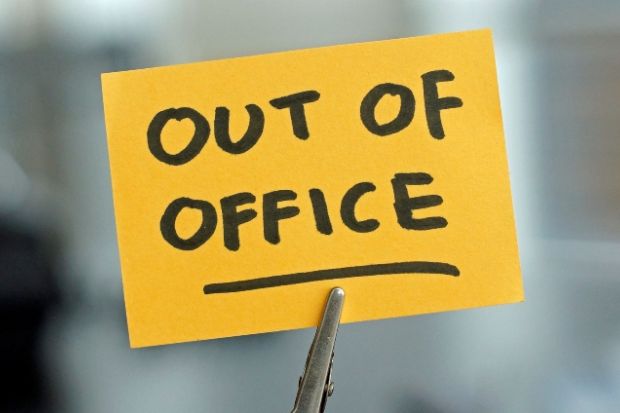I’m a lecturer in a big humanities department at a Russell Group university. I’m mid-career and midlife, but, like many academics, decidedly not middle-of-the-road: my political views are firmly on the left. That is, most pollsters, political parties and certainly Tories would consider me “left-wing”.
In the fevered Twitter universe of the UK’s Universities and College Union Left, however, I’m considered a “fatalistic” and “naive” advocate of “partnership unionism” who believes in the potential of collective bargaining to achieve concrete gains. Guilty as charged.
For many years, our department had a strong contingent of UCU dues-payers. We were always union members, but not union activists. That changed in February 2018 with “the Great University Strike”.
It was perfectly obvious to us that our pensions were under attack, and that the Universities Superannuation Scheme was fiddling the valuation. Everyone heard the talk about Oxbridge colleges seeking to shirk the sector’s collective responsibility for supporting the pension fund, and everyone understood that shifting our pensions to a defined-contribution scheme was a simple cash-grab by investment managers and universities.
Few of us understood the intricacies of fund valuations and actuarial assumptions, but it wasn’t hard to interpret the USS’ own data about how much retirement money we would lose.
So we struck, en masse. Colleagues showed up to picket lines with dogs and baked goods, guitars and children. And we stood in drifts of snow handing out leaflets to passing students. It was fantastic. And we won. The universities and the USS agreed to reconsider the valuation, and the new Joint Expert Panel set up between the UCU and Universities UK seemed like a favourable development. We were happy and proud. The details remained foggy, but the direction of travel seemed hopeful.
Over the next few years, it became clear that the new valuation process was going awry. The dismissal of Jane Hutton from the USS board, and the support of some university vice-chancellors for the UCU position, suggested that there was some broader governance problem making it difficult to resolve the situation.
The Financial Times – the Financial Times! – often reported on seeming improprieties in the process. Our victory seemed to be slipping through our hands. When the UCU balloted us for another strike, we voted yes.
The 2019 strike was even better than the previous one. Again the picket lines were lively, with dogs and babies and biscuits, and barbecues and silly songs and very supportive students. We had even larger numbers of staff on strike – 90 per cent in my department alone. Our vice-chancellor made statements that were quite emollient. We were heartened, and when negotiations resumed, we were glad to go back to teaching and leave it to the bargaining table. Again it was hard to follow all the details, but things seemed promising. Published proposals, especially in regard to casualisation, suggested that we were making real progress.
We were astonished this month suddenly to be notified that we are meant to go back on strike for 14 days during February and March over pensions and pay conditions. Bargaining seemed to be under way, and many of us had no idea that our autumn vote could authorise repeated strike calls.
Our students had been warmly supportive in the fall, but now they are angry. And we can’t blame them. They have already missed numerous lectures and seminars. The additional strike days would mean that degree finalists would miss many more days of instruction, while they were writing summative essays and dissertations.
Most students would lose a quarter of their tuition for the year. We have a hard time imagining how to explain this to them, especially when it doesn’t make any sense to us.
That’s why we won’t go on strike this time. A strike really doesn’t make sense, not as a bargaining tactic for the union at this moment, and not as a pedagogical position for lecturers committed to our students.
This doesn’t make us scabs. We are trade unionists and will remain so. We are “independent”, another epithet sometimes launched at us by the UCU Left. We don’t mind the label. Being independent means that we can hold seeming contradictions in our head at the same time: UCU members can back our leaders despite their misguided strategy, and refusing to blindly follow an ill-conceived plan doesn’t make us bad trade unionists.
We voted for our general secretary Jo Grady, and we support her. But we were members of this union before her slate was elected, and we’ll still be members when new leadership comes in, because we are the union.
UCU’s higher education committee should take heed of members’ views and our actions. We hope that UCU thinks again, and doesn’t sacrifice our union’s solidarity for a strike that doesn’t need to happen right now. There is plenty of time for striking later, if this round of bargaining fails.
University leadership should also take heed. We are not afraid to strike, and we will do it again if we must.
But good-faith bargaining now – including issues beyond the pension, such as casualisation and pay equity – can build up reserves of goodwill between staff and management. Refusing to come to sensible compromises will only further antagonise staff, and lead to more disruption. While the minutiae of pension valuation are tedious, we can recognise reasonable offers when we see them. Let’s keep negotiating.
Why am I writing anonymously? Because the toxic internet climate is impossible to escape. The deluge of online harassment causes regular people to withdraw from public forums. Twitter conversations are very unlike the exchanges among colleagues in department corridors, pubs and picket lines.
Union democracy – any form of democracy – requires a public sphere free from bad-faith harassment, and space for more than 280 characters of text.
The author is lecturer at a Russell Group university.
Register to continue
Why register?
- Registration is free and only takes a moment
- Once registered, you can read 3 articles a month
- Sign up for our newsletter
Subscribe
Or subscribe for unlimited access to:
- Unlimited access to news, views, insights & reviews
- Digital editions
- Digital access to THE’s university and college rankings analysis
Already registered or a current subscriber?








